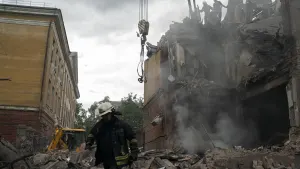More Stories
Russia's offensive in Ukraine edged closer to central Kyiv on Tuesday, with a series of strikes hitting a residential neighborhood as the leaders of three NATO member countries planned a visit to Ukraine's embattled capital.
Shortly before dawn, large explosions thundered across Kyiv from what Ukrainian authorities said was artillery strikes. The shelling ignited a huge fire and a frantic rescue effort in a 15-story apartment building. At least one person was killed and others remain trapped inside.
Shockwaves from an explosion also damaged the entry to a downtown subway station that has been used as a bomb shelter. City authorities tweeted an image of the blown-out facade, saying trains would no longer stop at the station.
As Russia stepped up its assault of Kyiv, the leaders of Poland, the Czech Republic and Slovenia planned to travel to Ukraine’s capital Tuesday on a European Union mission to show support for the country
“The aim of the visit is to express the European Union’s unequivocal support for Ukraine and its freedom and independence,” Czech Prime Minister Petr Fiala said in a tweet.
He will be joined by Slovenian Prime Minister Janez Janša, Polish Prime Minister Mateusz Morawiecki and Jaroslaw Kaczynski, who is Poland’s deputy prime minister for security and the leader of the conservative ruling party.
Russian and Ukrainian negotiators also planned to hold a second day of talks as Russia’s offensive in Ukraine entered its 21st day.
When Russia launched the war nearly three weeks ago, fear of an imminent invasion gripped the Ukrainian capital, and residents slept in subway stations or crammed onto trains to flee. But as the Russian offensive bogged down, Kyiv saw a relative lull.
Fighting has intensified on the city's outskirts in recent days, and sporadic air raid sirens ring out around the capital.
Ukrainian President Volodymyr Zelenskyy is seeking to extend martial law until April 24 and to require men ages 18 to 60 to stay in the country to fight. Zelenskyy submitted the extension in a bill to parliament, which is expected to vote on it this week.
In Washington, White House press secretary Jen Psaki said that while the Biden administration supports Ukraine’s participation in the talks with Russia, Russian President Vladimir Putin would have to show signs of de-escalating in order to demonstrate good faith.
U.S. national security adviser Jake Sullivan warned China against helping Russia during a meeting in Rome with a senior Chinese diplomat.
Two administration officials, speaking on condition of anonymity to discuss sensitive information, said China had signaled to Moscow that it would be willing to provide both military support in Ukraine and financial backing to help stave off effects of Western sanctions, which include a fourth set of EU sanctions announced late Monday.
The Kremlin has denied asking China for military equipment to use in Ukraine.
Kremlin spokesman Dmitry Peskov said Russia was able to continue the operation itself and it was “unfolding in accordance with the plan and will be completed on time and in full.”
In Kyiv, the early morning explosions were artillery strikes, the Ukrainian military said. They hit the Svyatoshynskyi district of western Kyiv, adjacent to the suburb of Irpin that has seen some of the worst battles of the war.
Flames shot out of the 15-story apartment building as firefighters climbed ladders to rescue people. Smoke choked the air. A firefighter at the scene confirmed one person had died and that several had been rescued, but others remained inside as rescuers tried to reach them.
Damage from unspecified ammunition prompted another in a 10-story apartment building in the Podilsky district of Kyiv, north of the government quarter. One person was hospitalized, the state emergency agency reported.
Russian forces also stepped up strikes overnight on the northwest suburbs of Irpin, Hostomel and Bucha, said the head of the Kyiv region, Oleksiy Kuleba.
“Many streets (in those areas) have been turned into a mush of steel and concrete. People have been hiding for weeks in basements, and are afraid to go out even for evacuations,” Kuleba said on Ukrainian television.
Russian troops were still about 15 kilometers (9 miles) from the center of Kyiv as of Monday, according to a senior U.S. defense official. Overall, nearly all of the Russian military offensives made little progress over the weekend, said the official, who spoke on condition of anonymity to discuss the Pentagon's assessment.
The official said that Russian forces have launched more than 900 missiles but have not taken control of the air above Ukraine.
The Ukrainian general prosecutor’s office on Tuesday released details of two deadly Russian attacks the day before. The office said an artillery strike had hit a university and open-air market, killing 10, and that a 65-year-old woman had been shot in a bus that was evacuating civilians from a Kyiv suburb.
Russian artillery fire also hit a nine-story apartment building in the northern Obolonskyi district of the city, killing two more people, authorities said. A town councilor for Brovary, east of Kyiv, was killed in fighting there, officials said.
And a Russian airstrike near a Ukrainian checkpoint caused extensive damage to a downtown Kyiv neighborhood, killing one person, Ukraine's emergency agency said.
Kateryna Lot said she was in her apartment as her child did homework when they heard a loud explosion and ran to take shelter.
“The child became hysterical. Our windows and the balcony were shattered. Part of the floor fell down,” she said. “It was very, very scary.”
In an area outside Kyiv, Fox News reporter Benjamin Hall was injured while reporting and was hospitalized, the network said.
In Russia, the live main evening news program on state television was briefly interrupted by a woman who walked into the studio holding a poster against the war. The OVD-Info website that monitors political arrests identified her as a Channel 1 employee and said she was taken into police custody.
There was a rare glimmer of hope in the encircled port city of Mariupol after a convoy of 160 civilian cars left along a designated humanitarian route, the city council reported Monday. Over the past 10 days or so, the lethal siege has pulverized homes and other buildings and left people desperate for food, water, heat and medicine.
In Mariupol, where the war has produced some of the greatest suffering, the city council didn’t say how many people were in the convoy of cars headed westward for the city of Zaporizhzhia. But it said a cease-fire along the route appeared to be holding.
Previous attempts to evacuate civilians and deliver humanitarian aid to the southern city of 430,000 were thwarted by fighting.
Ukraine’s military said it repelled an attempt Monday to take control of Mariupol by Russian forces, who were forced to retreat. Satellite images from Maxar Technologies showed fires burning across the city, with many high-rise apartment buildings heavily damaged or destroyed.
Ukraine claims its forces have killed 150 Russian troops and destroyed two Russian tanks in the battle for Mariupol.
The Kremlin-backed leader of the Russian region of Chechnya said on a messaging app that Chechen fighters were spearheading the offensive on Mariupol.
The Russian military said 20 civilians in the separatist-controlled city of Donetsk in eastern Ukraine were killed by a ballistic missile launched by Ukrainian forces. The claim could not be independently verified.
The U.N. has recorded at least 596 civilian deaths since Russia invaded Ukraine on Feb. 24, though it believes the true toll is much higher. Millions more have fled their homes, with more than 2.8 million crossing into Poland and other neighboring countries in what the U.N. has called Europe’s biggest refugee crisis since World War II.
Russia’s military is bigger and better equipped than Ukraine’s, but its troops have faced stiffer-than-expected resistance, bolstered by arms supplied by the West.
More from News 12
1:37

Election of Donald Trump stokes both hope and concern among Brooklyn's Ukrainian community
2:11
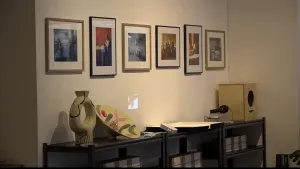
Ukrainian artists' Brooklyn exhibit tell the story of their war-torn country
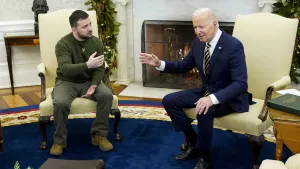
Zelenskyy thanks 'every American,' sees 'turning point'
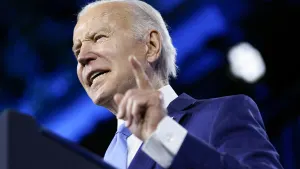
President Biden pledges $2.9B in food security aid amid Ukraine war
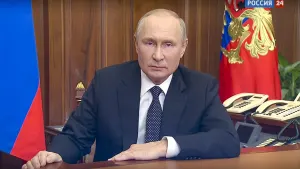
Putin sets partial military call-up, won’t ‘bluff’ on nukes
1:04
